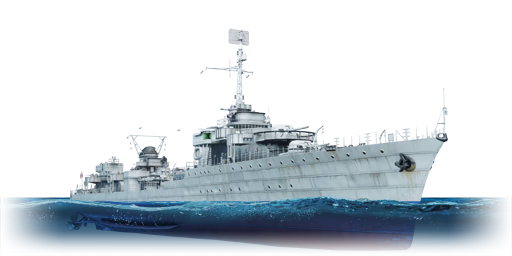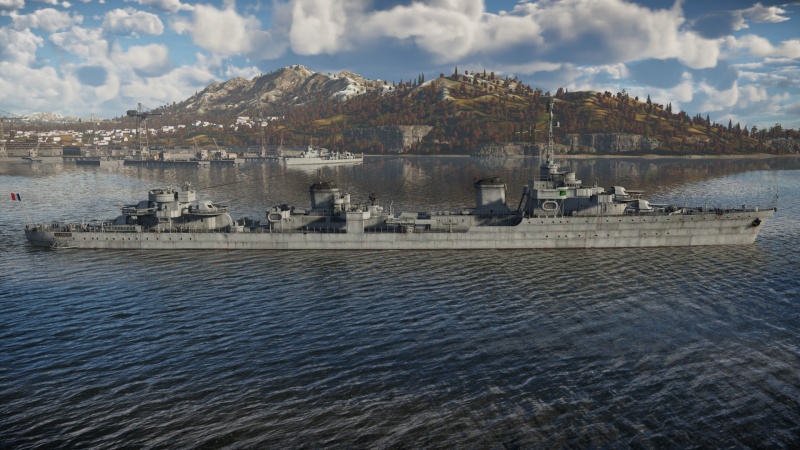Le Malin
Contents
Description
Le Malin was the first of the Le Fantasque destroyers to be launched off slipway in 1933. With the beginning of World War Two, she was delegated to hunting down German commerce raiders in the central Atlantic. Following the fall of France, she avoided British attack on Mers-el-Kébir, and escorted surviving French ships to the mainland, fighting for Vichy France. In 1942, she underwent refit in Casablanca until the port was attacked by the US Navy. A near-miss from the battleship USS Massachusetts blew a hole in the hull of the vessel, killing 7 crewmen, disabling one of the boilers, and causing a significant list to the port. The vessel was captured by Americans and passed on to the Free French, but due to the lack of facilities she received only temporary repairs and was rebased to Boston, where she received repairs and refit (as modelled in-game). In service of the Free French, she participated in the Battle of Ist and numerous minor duties across the Atlantic and Mediterranean. Post-war, she served as an escort vessel for French carriers, later being delegated to the role of a stationary training vessel and eventually a floating jetty before being stricken off in 1964.
Le Malin was introduced in Update "La Royale" and, typically for French destroyers, she features a combination of excellent speed with great firepower. However, her main guns suffer from being unable to rotate fast enough to keep up with the turn rate of the vessel, having horizontal targeting speed slower than most heavy cruisers. She's best used as a somewhat limited destroyer - to deal with enemy vessels (including light cruisers), and capture the points, preferably always keeping the enemies on one side of the vessel to ensure they remain within firing angles for as long as possible.
General info
Survivability and armour
The vehicle's survivability is mediocre at best. While the vehicle has a fairly sized crew and lots of empty space to absorb shells, it also has a huge silhouette which makes it easy to get hit. Additionally, the large unarmoured bridge can be taken out with ease, which can negate one of your most powerful advantages- your potent mobility. This can be especially crippling as your turret traverse is extremely poor, which means if you get stuck in a turn with your bridge destroyed, you are highly unlikely to be able to return fire to the enemy.
Mobility
The ship has good manoeuvrability. It is exceptionally fast in a straight line and it is quite agile, with a reasonable rudder shift speed and turn rate. Compared to Tashkent, which has nearly identical maximum speed, it has a ~20% smaller turn radius, making it much easier to avoid torpedoes or throw enemy aim off. Its reverse speed is average, although it does take quite a while to stop from full speed.
| Mobility Characteristics | |||||
|---|---|---|---|---|---|
| Game Mode | Upgrade Status | Maximum Speed (km/h) | Turn Time (s) | Turn Radius (m) | |
| Forward | Reverse | ||||
| AB | Stock | 70 | 23 | ~122.55 | ~265.48 |
| Upgraded | 96 | 31 | ___ | ___ | |
| RB/SB | |||||
| Upgraded | 78 | 25 | ___ | ___ | |
Modifications and economy
Armament
Primary armament
The main guns of this ship are generally very potent, but in a few situations they can be near useless. They have a fast reload and high-yield SAP which will deal plenty of damage and will overpenetrate less than pure AP or APCBC rounds. However, they have limited capability against larger ships with more armour, because they have very little penetration. The guns also have a slow traverse rate, which can make getting guns on target quite difficult, especially when a target is moving.
| Penetration statistics | |||||||
|---|---|---|---|---|---|---|---|
| Ammunition | Type of warhead |
Penetration @ 0° Angle of Attack (mm) | |||||
| 1,000 m | 2,500 m | 5,000 m | 7,500 m | 10,000 m | 15,000 m | ||
| OEA Mle 1928 | HE | 36 | 36 | 36 | 36 | 36 | 36 |
| OPFA Mle 1924 | SAPBC | 77 | 67 | 54 | 43 | 36 | 30 |
| Shell details | ||||||||||||
|---|---|---|---|---|---|---|---|---|---|---|---|---|
| Ammunition | Type of warhead |
Velocity (m/s) |
Projectile mass (kg) |
Fuse delay (s) |
Fuse sensitivity (mm) |
Explosive mass (TNT equivalent) (kg) |
Ricochet | |||||
| 0% | 50% | 100% | ||||||||||
| OEA Mle 1928 | HE | 800 | 40.2 | 0 | 0.1 | 3.41 | 79° | 80° | 81° | |||
| OPFA Mle 1924 | SAPBC | 800 | 39.9 | 0.05 | 6 | 2.53 | 48° | 63° | 71° | |||
Secondary armament
The 40 mm Bofors guns are powerful against small coastal vessels, and using AP clips gives them increased potency against more armoured vessels. They can be used with some success against early destroyers, although this should be a last-ditch effort, in case the main armament is unable to fire for some reason.
- Universal: AP-T · HEFI-T
- 40 mm HE clips: HEFI-T · HEFI-T · HEFI-T · AP-T
- 40 mm AP clips: AP-T · AP-T · AP-T · HEFI-T
| Penetration statistics | |||||||
|---|---|---|---|---|---|---|---|
| Ammunition | Penetration @ 0° Angle of Attack (mm) | ||||||
| 10 m | 100 m | 500 m | 1,000 m | 1,500 m | 2,000 m | ||
| HEFI-T | 3 | 3 | 3 | 3 | 3 | 3 | |
| AP-T | 81 | 78 | 68 | 58 | 49 | 41 | |
| Shell details | ||||||||||||
|---|---|---|---|---|---|---|---|---|---|---|---|---|
| Ammunition | Velocity (m/s) |
Projectile mass (kg) |
Fuse delay (m) |
Fuse sensitivity (mm) |
Explosive mass (TNT equivalent) (g) |
Ricochet | ||||||
| 0% | 50% | 100% | ||||||||||
| HEFI-T | 874 | 0.9 | 0 | 0.1 | 67.13 | 79° | 80° | 81° | ||||
| AP-T | 874 | 0.89 | - | - | - | 47° | 60° | 65° | ||||
Anti-aircraft armament
The AA suite of this vessel is quite powerful. It consists of the ubiquitous 40 mm Bofors and the 20 mm Oerlikon guns. The fast-rotation rate of the Oerlikons provides a useful close-defence against small torpedo boats, which is a real weakness of the ship at close range because of the slow rotation speed of the main batteries. The AA is very effective against all sizes of planes, being able to produce a large screen of lead that will take down even the most manoeuvrable fighters at quite impressive ranges.
Additional armament
The ship has a triple torpedo tube on either side of the superstructure amidships near the funnels. These torpedoes are often of limited use as they are quite slow, but can be useful in a pinch at close range or against larger ships which the high-yield SAP of the main armament will struggle to penetrate. The location of these tubes can be somewhat annoying, as unlike on other ships, each set of tubes can only fire to one side. This means only one will be able to bear on a target at a time.
Usage in battles
Le Malin is best characterised by its excellent firepower and speed, at the expense of a lack of flexibility, due to the slow turret traverse. This makes it difficult to switch between targets when manoeuvring, and especially tricky to deal with any surprises or when moving between islands (such as is common on Palau islands or some portions of South Kvarken). This makes it necessary to get used to switching manual control to the secondary or even anti-air guns in order to deal with enemy Motor Torpedo Boats and other coastal vessels, or even to quickly disable enemy primary guns.
That said, when Le Malin has an opportunity to dictate the encounter it will outgun most of the enemy destroyers, often being able to one-shot aft magazines with the large explosive filler of the guns.
Pros and cons
Pros:
- Fast
- Average agility
- Excellent firepower
- SAP has plenty of explosive filler
- Potent AA armament
- Fast reloading main guns
Cons:
- Large profile
- Unarmoured
- SAP shells have very little pen- will struggle to deal with more armoured vessels
- Very slow turret traverse
- Somewhat awkward position of torpedo tubes
History
The Le Malin was a member of the Le Fantasque class of contre-torpilleurs that were built in the 1930s. The Le Malin herself entered service in 1935. The class was built to counter the Condottieri-class light cruisers of the Italian Navy. The ships were extremely fast (Le Terrible set a new speed record for a conventionally hulled boat of 45 knots during her trials) and had a powerful armament of five 138.6 mm/50 model 1929 (138.6 mm) guns in single mounts. They had a range of 2,900 miles at 15 knots. The ship was a member of the Force de Raid at the start of WW2, and engaged German units in Norway in April 1940. She escorted convoys evacuating personnel from France to French North Africa, and stayed with Vichy France after the French surrender.
Media
- Skins
See also
Links to articles on the War Thunder Wiki that you think will be useful for the reader, for example:
- reference to the series of the ship;
- links to approximate analogues of other nations and research trees.
External links
- [Devblog] Le Malin: the malign destroyer
- [Wikipedia] French destroyer Le Malin
- [uboat.net] FR Le Malin
- [Wrecks-Site] Le Malin (1956~1964) Le Malin (Q359)
| Société Nouvelle des Forges et Chantiers de la Méditerranée (FCM) | |
|---|---|
| Ships | |
| Destroyers | |
| Aigle-class | Vautour |
| Le Fantasque-class | Le Malin |
| Battleships | |
| Courbet-class | Paris |
| Tanks | |
| Light tank | FCM.36 |
| Heavy tank | 2C · 2C bis |
| France destroyers | |
|---|---|
| Bourrasque-class | Bourrasque · Tornade |
| Chacal-class | Chacal · Leopard · Panthere |
| Aigle-class | Aigle · Vautour · Milan |
| Vauquelin-class | Vauquelin |
| Le Fantasque-class | Le Malin · Le Triomphant |
| Mogador-class | Mogador |
| Hunt-class | La Combattante |
| Trophies | Germany |
| Desaix-class¹ | Kleber |
| Type 1936 | Marceau |
| Italy | |
| Chateaurenault-class² | Guichen |
| Modified: ¹Type 1934A-class destroyers · ²Capitani Romani-class cruisers | |





